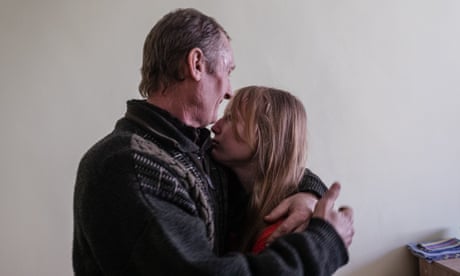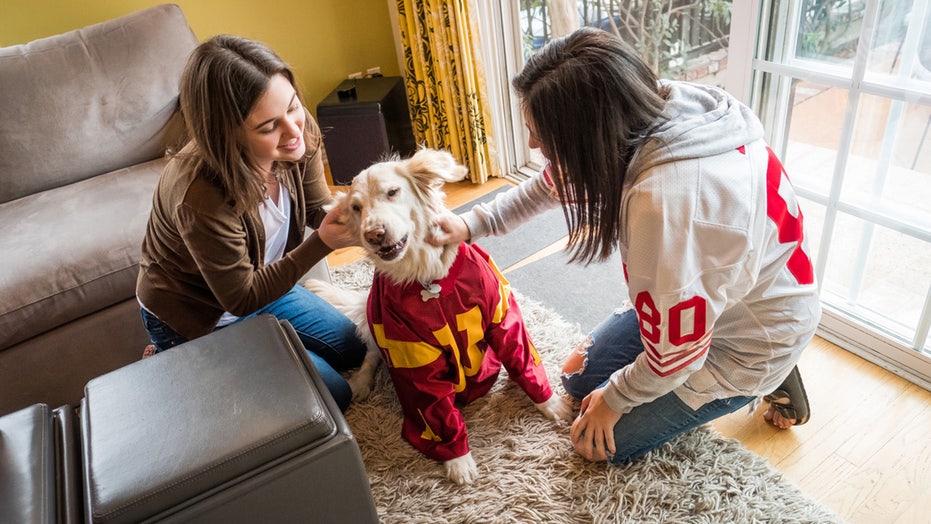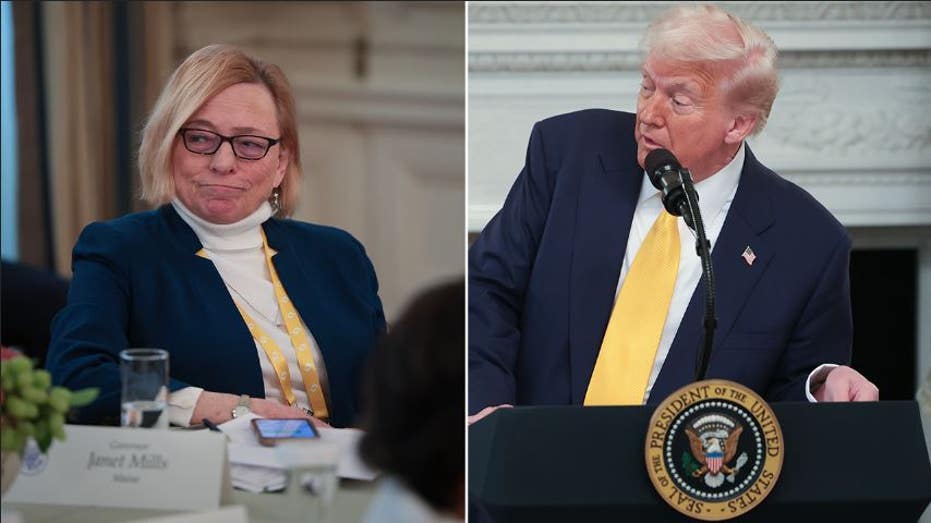- by foxnews
- 15 Mar 2025
‘First you cry, then get used to it’: Ukraine villagers find a kind of refuge in Mykolaiv
‘First you cry, then get used to it’: Ukraine villagers find a kind of refuge in Mykolaiv
- by theguardian
- 17 Mar 2022
- in news

After an airstrike flattened the school behind his house and artillery shells ripped apart a circle of neighbouring homes, Dmitry Yakhshyboyev went out to look for petrol.
His family, from seven-month-old son to parents in their 70s, had been cowering in their basement without heating, electricity or running water for two days, as Russian forces assaulted their village.
As the occupying soldiers razed buildings to the ground, taking their chances on a dash past tanks and through the frontlines gradually came to seem like the safer option for Yakhshyboyev's family.
"We had a choice. Stay and die, or risk driving through the shelling," he said, tracing the circles of destruction on a satellite map of his village, Posad-Pokrovske.
They had an ancient Soviet-era Zhiguli car, its back windscreen blown out by shockwaves from the bomb that levelled the school. Yakhshyboyev's boss at an IT store had stored about 10 litres of petrol.
So on Wednesday morning, the day after the school was brought down, and one neighbour's house so totally incinerated that the remains "looked like an ashtray", they set off in a two-car convoy.
There was barely room to cram their family into the car, with a small backpack of vital documents. The animals he loved like family - three dogs, seven cats, a cow, three pigs, three guinea pigs and several parrots - were set free to give them some tiny chance of survival.
"What a terrible day, what a terrible life," he said, burying his face in his hands as he listed the beloved companions left behind.
When the group reached the relative safety of the port city of Mykolaiv, they paused, briefly, to gather supplies, patch up the back of the car with plastic, and consider how their lives had been ripped apart by the war.
It is a mark of how vicious the war in Ukraine has become that they considered this frontline city, where conversations are punctuated by the regular thud of artillery exchanges, something of a refuge.
Mykolaiv itself has been under intense bombardment since the first days of Russia's invasion of Ukraine, because it controls a crucial bridge to the city of Odesa, cultural and economic jewel of the Black Sea coast.
Without control of the port and the crossing of the Buh river, it would be very difficult for Russian forces to supply anyone fighting for Odesa, which has defied expectations. Ukrainian forces have not only held out, but say they are now pushing Russian forces - once just outside the airport - several miles from its outskirts.
"The city is safe enough," said Vitaly Kim, the young governor of the Mykolaiv region, whose upbeat daily videos on social media have helped keep up morale in the city as it was pounded by Russian forces.
"The battles are now about 20km [12 miles] outside the city; we are on the offensive now," he told the Guardian in an interview in his heavily fortified offices.
Despite his optimism about the city, he acknowledged terrible loses in areas still under attack; in some the fighting has been so intense that bodies lie uncollected in the streets, locals said.
"In small villages [in contested areas] there is a terrible situation, because Russians bombard them. But I can't do anything about Russian bombs because we have open skies."
Russian warships are also massing ominously in the Black Sea south of the port, raising the risk of fresh attacks on a city still reeling from weeks of heavy assault. More than half the prewar population has fled, and those that remain are hungry and running out of vital medicines.
"There are food shortages, medication shortages and a refugee crisis of people who have fled into the city from nearby villages. Lots of people who want to leave cannot, and this is a major problem," said Andriy Skorokhod, head of the local branch of the Red Cross.
Medicines that are running out include insulin and L-thyroxine - a medication needed by survivors of the 1986 Chernobyl nuclear reactor disaster. "Because of Chernobyl, we have a lot of people dependent on this, but we are out of stock. Actually it is a national problem," Skorokhod said.
Kim, the governor, said supplies were being rationed as the city stockpiled to prepare for possible siege, but no one should be going hungry. "Compared to normal life the situation is bad, but for wartime life, the situation is good. People have everything they need, although not everything they want."
For now, the city is not besieged, but the main highway to Kyiv has been cut and many drivers are fearful of the 75-mile road to Odesa, Kim said. And as residents leave, they are replaced by people escaping from the rural frontlines.
Red Cross buses can only take out about 1,000 people a day, from a city that before the war was home to nearly half a million people.
Tatiana and Sergei Pinaev, 41 and 49 years old, hitchhiked out of their village north of Mykolaiv on Wednesday morning. It sits on a highway and there had been fighting in the area for weeks, which recently became too intense.
"The Russians looted the shops, and bombed the kindergarten," said Tatiana, sharing pictures of a Russian tank marked with the "Z" which has become the symbol of Moscow's campaign, taken secretly from her yard.
War planes roared low and loud overhead so often that the children learned to sleep through it, to Tatania's horror. "First you cry, but then you get used to it," said 13-year-old Anastasia. Her mother decided that the sounds of war were not the lessons she wanted for her children.
They had to leave without his elderly parents, too frail to travel, who urged the couple to save their children then try to come back.
Picked up from the wreckage of their village by a friend, they were dropped at the Mykolaiv train station with little money and few ideas about how to escape beyond heading west towards relatives in Germany.
They found a Red Cross volunteer who took them to a shelter, and asked them, as the thud of artillery rounds echoed in the distance, where they wanted to go next.
But another heartbreaking parting already loomed, the war which had taken away their home, now ripping apart their family.
Sergei would have to go and register at the military commission, the Red Cross team said. As the father of three children under 18, he should be legally exempt from a bar on leaving the country, but no one in Mykolaiv appeared to know this rule.
His daughters, Anastasia and six-year-old Veronica, threw themselves at him weeping and begging "no, Papa", and "please don't go".
As the family were ushered outside, the mother and children to a bus, the father to an uncertain future, a new throng of dazed escapers from the frontline, carrying small bags or nothing at all, filed off a bus outside the Red Cross centre.
A month ago, Konstantin Hakimov was head of customs in the small port of Chornomorsk, south of Odesa. Now he spends his days driving into frontline areas around Mykolaiv to pick up stranded civilians in old city buses.
He had been out twice on Wednesday by midday, his hands caked with grime from long days on duty, when he stopped for an embrace from one passenger, an old woman who thanked him, but begged him to go back for her husband.
"They don't shoot civilians but they will shoot soldiers. Everything there is destroyed, and there are Russians around," he said. "I volunteered because we have to get the civilians out, and if I don't do it who will?"
- by travelandtourworld
- descember 09, 2016
Saudi Arabia Enhances Travel With Over 3,400 Haramain High-Speed Rail Trips, Connecting Mecca And Medina In Just Two Hours
Saudi Arabia boosts Ramadan travel with over 3,400 Haramain High-Speed Rail trips, enhancing pilgrim mobility between Mecca, Medina, and key destinations.
read more


